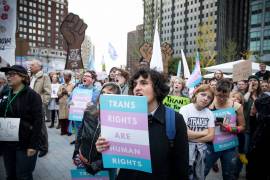
When Justice Is for Sale, More People Go to Jail!
Blog Search
It’s election season, and if you live in one of the 39 states that elect judges, you may have seen one of those ‘soft on crime’ TV ads claiming that a judicial candidate “sides with child predators,” “is sympathetic to rapists” or “helped free a terrorist.”
It might come as no surprise to learn that these ads, while vile, are very effective at influencing elections. But it shocks the conscience to discover that they are also influencing judges’ rulings in criminal cases!
Nearly 80% of Americans fear that campaign cash is affecting courtroom decisions. In Skewed Justice, a new study sponsored by the American Constitution Society, empirical research proves that fear is well-founded. The study’s conclusion: TV attacks ads in judicial elections are costing people their liberty.
According to the study, the more TV ads aired during state supreme court judicial elections, the less likely justices were to find for criminal defendants. The results predict, on average, that a state with 10,000 ads would see judges vote differently and against criminal defendants in 8 out of 100 cases.
This finding is outrageous, and the implications are far-reaching. Criminal caseloads in our state trial courts totaled about 20.5 million in 2012, and disproportionately represented in this statistic are people of color, low-income people, LGBT people and those living with HIV. According to the NAACP, together, African American and Hispanics make up 58% of all prisoners in 2008, even though they are approximately one-quarter of the U.S. population.
If you are a defendant up against the state in one of these criminal cases, receiving a fair trial is fundamental to accessing justice. This means, among other factors, that the case must be presided over by an impartial judge who makes decisions based on the law and the facts and not on campaign contributions and super-PAC spending or concerns that the judge will be labeled “soft on crime.”
But judicial elections and spending by special interest groups are making it difficult for our system of justice to function.
The U.S. is not only home to 25% of the word’s prison population, but virtually 100% of the world’s elected judges. These are often the same judges who decide what evidence is allowed at trial, whether there was an unconstitutional search or seizure, who ends up in jail and for how long, or even whether the death penalty will be imposed.
A century or more ago, many of the states in the U.S. decided to adopt popular elections as their way of selecting their judges. Unfortunately, Citizens United, the 2010 Supreme Court ruling that unleashed unlimited independent spending in elections, has dramatically altered the politics of judicial races, blurring the line that separates justice from politics.
Dissenting in Citizens United, retired Supreme Court Justice John Paul Stevens noted the decision “unleashes the floodgates of corporate and union general treasury spending” in judicial elections at a time “when concerns about the conduct of judicial elections have reached a fever pitch.” The Justice was right. Spending in judicial elections is skyrocketing. There was an estimated $54.6 million spent on judicial races overall during the 2011-12 election cycle, with $33.7 million in TV spending alone.
Some of the most despicable TV attack ads don’t come from groups interested in criminal justice at all, but rather from powerful business and political interests that wish to remove judges who rule against them on issues like voting rights, reproductive justice, consumer protections or LGBT equality. These groups simply use “soft on crime” ads as a means to exploit viewers’ emotions, at the expense of criminal defendants and judicial fairness.
The authors of Skewed Justice offer a grim warning that their findings are likely to be only a preview of escalating trends since Citizens United, and that special interests have “only begun to professionalize their operations and will only grow more sophisticated in the years to come.”
Lambda Legal’s Fair Courts Project works to preserve judicial independence and improve access to justice for ALL people. Lambda Legal recently completed a national survey to assess whether courts and other government institutions are properly protecting and serving LGBT people and people living with HIV. Our fight for fair courts includes ensuring justice isn’t for sale. As retired Supreme Court Justice Sandra Day O’Connor has said, “[in] these challenging and difficult times, we must recommit ourselves to maintaining the independent judiciary that our Framers sought to establish.”




